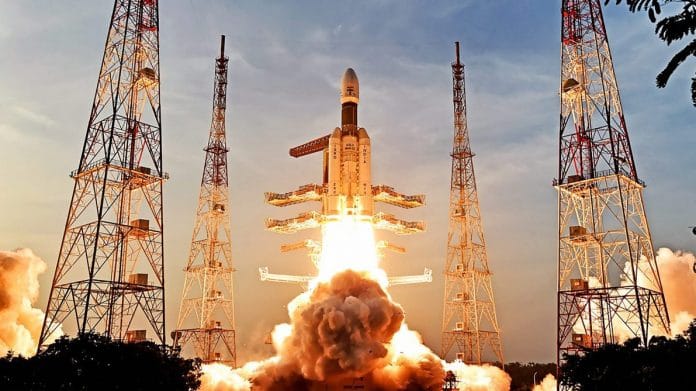There is a reason why the phrase ‘rocket science’ is used to describe things that are really tough to learn. Turning oneself into a space entrepreneur is an example of such tough learning, with not only having to achieve the technical bit of it, but also needing to get its business fundamentals right.
With over six decades of investments in the space sector, there is tremendous capacity the Indian Space Research Organisation (ISRO) has created, which now acts as a foundation for space entrepreneurs to sprout in India.
Understanding India’s position in global space economy
According to popular estimates, the global space industry is about $350 billion. Currently, the only major service that India provides to the global space market is the space launch service offered by the ISRO, which is very popular among foreign satellite operators. But even with hundreds of foreign satellites being launched by ISRO, India occupies less than one per cent of global space trade.
However, here is what works in India’s favour.
There are veterans from ISRO to guide with their decades of experience of carrying out successful missions; there are institutions such as Indian Institute of Space Science and Technology along with other science and engineering institutions, which produce excellent quality of graduates who can be readily absorbed; there’s also a 500-strong Small and Medium Enterprises (SME) base that is integrated into ISRO’s supply chain; the country also has the much-needed infrastructure to develop space products and services — with all these there is a strong foundation for India to witness the emergence of startups that can not only cater to the requirements within the country, but can also take Indian-built space products and services to global markets.
Also read: Building thick houses & eating tomatoes: The unexpected realities of living on the moon
The space business
The space business can simply be divided into two parts.
The first part has to do with everything in terms of putting up infrastructure in space and the ability to control it from the ground. This is what we see the ISRO doing routinely by building rockets, putting satellites up and controlling them using their antennas.
The second part is using the satellites and the infrastructure up in orbit to provide services that people will use on Earth. The simplest examples of this are everything — from an Ola driver who uses GPS to navigate to Tata Sky one uses to watch TV.
Until now, the private sector in India has mostly been acting as vendors to ISRO by providing the space agency parts that will be finally integrated by its engineers and flown. Last year, we saw India’s first private satellite, ExseedSat1, which was flown on a SpaceX rocket.
If you are someone who is electronics or hardware geek, this is where you can look to innovate by building your satellite and providing a service. The type of service could be imaging parts of Earth to provide information to various industries, providing data/voice/video connectivity, tracking assets, etc.
If you have great software skills and can work all the hot new topics like machine-learning, big data, artificial intelligence, etc. there are tonnes of data captured by hundreds of satellites out there for the last 30 years or so that you can help process to extract insights for various industries. For example, you can map migration of people from villages to emerging tier-1 and tier-2 cities and help banks, restaurant chains, real estate, etc. with decisions on which locations they could be investing in so that they enter those geographies beforehand and gain the first mover advantage.
If you are someone who has concerns for the environment, you could take datasets for a number of decades and map change in environment, forests, water bodies, etc. to provide insights on these very important aspects for which access to authentic data may be very difficult.
Fertile ground for space entrepreneurship
Space activities in India are mostly a G2G affair. This means that ISRO is looking at doing several missions in support of serving the requirements of other government departments and ministries. This is also one of the reasons why India still relies heavily on foreign satellites to satisfy Direct-To-Home (DTH) TV demand in the country.
The revolution of being able to flow shoe-box size satellites with miniaturised electronics alongside the ability to use technologies such as cloud, etc. means that startups around the world are now attempting to tap into potential services they can provide directly to businesses or to consumers directly.
The simplest example of this in the Indian context could be a startup servicing to a corporate like JCB or L&T to collect data from their excavators that are operating in remote regions in India to help do predictive maintenance to assist their owners to tackle down-time of these machines. In this case, every excavator could use a network of satellites to send hourly information on their engine status, location, etc. to help track the operational health and avoid damages that can stop them working for a few days, causing losses to their owners.
There can be endless such B2B or B2C services that can be assessed to potentially build a viable space business in India today. The emergence of almost a dozen startups in the country such as Bellatrix Aerospace, Exseed Space, Astrome, Kawa Space, Skyroot Aerospace, etc. are early evidence of entrepreneurs thinking of such opportunities.
There is definitely room for several other startups as well. ISRO will do the country a great service if it comes up with novel ways to specifically support entrepreneurs, who are trying to take baby steps in maturing the space startup ecosystem in India.
Also read: 42 years of Wow! Signal — our missed opportunity for ‘alien contact’
The writer is a space industry expert and founder of NewSpace India, a networking community for space-related developments in India.






